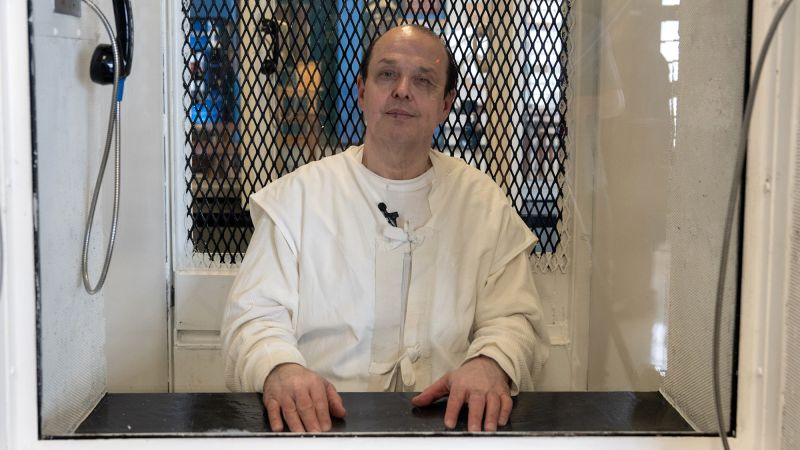The Unfolding Case of Robert Roberson: A Battle Against the Clock
With just over a day remaining before the planned execution of Texas death row inmate Robert Roberson, calls for clemency are continuously intensifying. Roberson stands accused of the horrific crime of murdering his two-year-old daughter, Nikki Curtis. However, advocates for Roberson are adamant that he is innocent and that a grave miscarriage of justice has occurred.
The Fight for Clemency
Despite supporters’ pleas for a reconsideration of Roberson’s case, efforts to halt his execution have yet to bear fruit. Recently, the Texas Board of Pardons and Paroles denied a recommendation for clemency, dismissing requests from Roberson’s attorneys for either a commutation of his death sentence to a lesser penalty or a 180-day reprieve to fully explore legal options and new evidence.
The Controversial Basis for Conviction
Should the execution proceed as scheduled, Roberson would become the first person executed in the United States based primarily on a conviction related to shaken baby syndrome—a diagnosis that many now argue has been discredited. Defense attorneys assert that the medical reasoning behind his conviction was fundamentally flawed, leading to a potentially innocent man facing lethal injection.
The Role of the Medical Community
Advocates for Roberson are leveraging new medical and scientific evidence to support claims that Nikki’s death stemmed from natural causes—double pneumonia that led to sepsis, complicated by prior health issues and inappropriate medication rather than abusive actions. Roberson’s team emphasizes that crucial symptoms were misinterpreted by medical professionals who assumed abuse without thoroughly investigating Nikki’s medical history.
The Defense’s Assertions
Roberson’s defense paints a stark picture of the critical oversight that led to his conviction. They assert that treating doctors rushed to judgment, presuming abuse without considering Nikki’s existing health problems or recent injuries, such as a fall from a bed. Moreover, many legal experts are considering Roberson’s behavior during the emergency response—a perception of emotional detachment—as a misinterpretation due to his undiagnosed autism spectrum disorder.
A Former Detective’s Regret
Adding weight to claims of wrongful conviction, Brian Wharton, the former detective who led the investigation into Nikki’s death, has openly expressed regret over the narrow focus of his original inquiry. He has since become a vocal advocate for Roberson, asserting that the evidence that could exonerate him must be given its due consideration.
The Broader Implications of Roberson’s Case
The Roberson affair underscores the grave risk involved in capital punishment: the possibility of executing an innocent person. Data from the Death Penalty Information Center reveals that since 1973, 200 individuals—including 18 from Texas—have been exonerated after wrongful convictions. Roberson’s case now echoes those haunting narratives, reigniting the debate surrounding the death penalty’s flaws.
Recent Legal Developments
As Roberson’s legal battles continue, the Texas Court of Criminal Appeals recently denied an appeal, even as another case based on shaken baby syndrome received a new trial order. His attorneys have also petitioned the U.S. Supreme Court, claiming violations of due process rights by state courts that ignored critical evidence seemingly supporting Roberson’s innocence.
A Push for Awareness
In parallel with legal efforts, Roberson’s supporters strive to raise public awareness about his plight. The Texas Committee on Criminal Jurisprudence is set to hold a hearing addressing capital punishment and the so-called “junk science writ” that offers pathways for challenging convictions based on new scientific evidence that was unavailable during original trials.
The committee members have strongly advocated for a pause in Roberson’s execution, calling attention to the out-of-date scientific interpretations that underpinned his original conviction.
A Bipartisan Concern
Remarkably, a broad coalition of over 80 Texas legislators has rallied behind Roberson, expressing their concerns about the implications of his execution. Representative Joe Moody, chair of the criminal jurisprudence committee, recently urged a reconsideration of Roberson’s case, cautioning that moving forward with the execution could tarnish the judicial system’s integrity for years to come.
High-Profile Support
Prominent figures like author John Grisham, a board member of the Innocence Project, have also voiced their support for Roberson. In a recent op-ed, Grisham criticized the lack of responsiveness from those in power to the compelling evidence presented in Roberson’s defense.
The Ongoing Debate
The heated discourse surrounding shaken baby syndrome continues to present challenges in the courtroom. While the diagnosis remains widely accepted by the medical community as an indicator of child abuse, defense attorneys argue that the potential for natural causes to mimic the syndrome’s symptoms must be considered.
The divide among experts indicates that many factors are taken into account when determining the cause of trauma in infants, raising questions about the reliability of eyewitness testimonies in these sensitive cases.
Critical Legal and Medical Perspectives
Challenging this narrative, child abuse pediatricians assert that abusive head trauma remains a valid diagnosis despite the ongoing debates. Recent statistical analyses have displayed starkly different figures regarding wrongful convictions in shaken baby syndrome cases, further complicating the discourse on medical testimony in court.
Conclusion: A Case Study in Justice
Roberson’s case shines a spotlight on the complexities of legal and medical interpretations that can lead to grave misjudgments in capital cases. As new evidence surfaces and advocacy groups rally for justice, the coming hours and days will be pivotal for Roberson and those fighting to save him from an irreversible fate.
